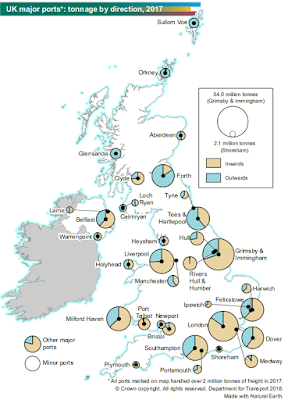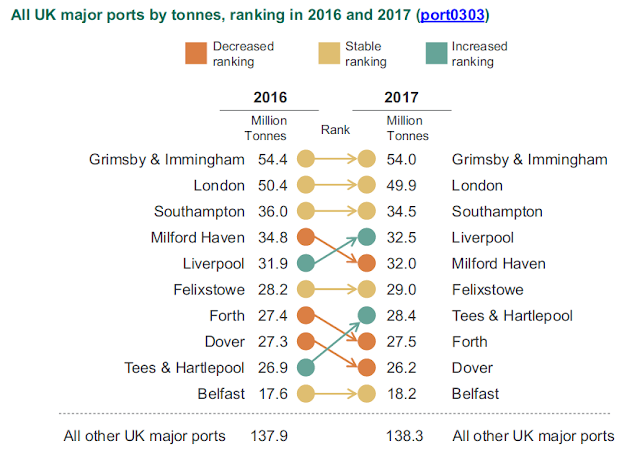UK ports imported 248m tonnes of produce and exported 138m tonnes in 2017. (See UK Port Freight Statistics 2017).
 |
| Click to enlarge. |
Dover was responsible for only 26m tonnes of the total 386m tonnes of international freight transported in 2017.
 |
| Top 10 major ports + All other tonnage |
Dover moved 15.5m tonnes inwards and 10.7 m tonnes outwards. Even in the worst case after Brexit the pictures of queuing lorries going into Dover might be impressive for a few weeks but it will have little effect overall on UK trade.
The major “fear” expressed in the media for a No Deal Brexit is an alleged inability to import food and other essentials such as medicines. This will depend nearly entirely on the speed with which the Port Authorities inspect incoming freight at Dover and other ports. In principle incoming freight can simply be waved through without inspection so would not be delayed at all.
There should be no delays at Calais for goods bound for Dover and the Head of Customs at Calais “explained that controls would be in the other direction — on trucks arriving from Britain — and that there would be extra resources if necessary.” for these.
The NHS has sent a memo saying that medicine supply will be fine but has failed to face up to their responsibility to inform the public.
The real risk with No Deal is not a failure of supply, it is a transient increase in problems for UK exporters.
The reporting of Project Yellowhammer failed to distinguish imports from exports and assigned delays to both equally. This is nonsense and deliberate alarmism.
According to the Times these are the major points from Yellowhammer:
These three points are absurd because they depend on imports that should be largely unaffected:
● Logjams caused by months of border delays could “affect fuel distribution”, potentially disrupting the fuel supply in London and the southeast of England
● Medical supplies will “be vulnerable to severe extended delays” as three-quarters of the UK’s medicines enter the country via the main Channel crossings
● The availability of fresh food will be reduced and prices will rise. This could hit “vulnerable groups”
(There is no reason to believe that severe delays to imported goods will occur, this is fearmongering).
The following points are vaguely possible because they are about outbound traffic but traffic can find alternative ports and routes:
● Up to 85% of lorries using the main Channel crossings “may not be ready” for French customs and could face delays of up to two and a half days
● Significant disruption at ports will last up to three months before the flow of traffic “improves” to 50-70% of the current rate
● Passenger delays at EU airports, St Pancras, Eurotunnel and Dover
Other points of dubious veracity, introduced for planning:
● The government expects the return of a hard border in Ireland as current plans to avoid widespread checks will prove “unsustainable”; this may spark protests, road blockages and “direct action”.
Comment on Times Article: This is only a reasonable supposition for the EU side of the border. The UK can assign Ports of Entry away from the border (Eire is also allowed to do this according to the EU Customs Code).
● Potential clashes between UK and European Economic Area fishing vessels amid predictions that 282 ships will sail in British waters illegally on Brexit day.
● Protests across the UK, which may “require significant amounts of police resource[s]”
● Rising costs will hit social care, with “smaller providers impacted within 2-3 months and larger providers 4-6 months after exit”
● Gibraltar will face delays of more than four hours at the border with Spain “for at least a few months”, which are likely to “adversely impact” its economy. (Editor’s Note: The government of Gibraltar said this report is “out of date and wrong“).
● Petrol import tariffs, which the government has set at 0%, will “inadvertently” lead to the closure of two oil refineries, 2,000 job losses, widespread strike action and disruptions to fuel availability.
This post was originally published by the author on his personal blog: http://pol-check.blogspot.com/2019/08/movement-of-goods-after-no-deal-brexit.html
 Daily Globe British Values, Global Perspective
Daily Globe British Values, Global Perspective



